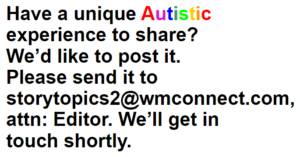I’m an autistic woman who uses eye contact to assert authority and dominance. To observers I have good eye contact. Here’s what’s really going on.
I was diagnosed with Autism Spectrum Disorder in spring of 2022.
I don’t recall any point in childhood where I struggled to hold eye contact or found it uncomfortable.
My Eye Contact As the Listener
When I give long eye contact while someone’s doing a lot of talking to me, I’m almost always aware of it — as I feel that it’s something that I have to do.
I feel that if I don’t keep sustaining this eye contact, the other person will think I’ve lost interest and may stop talking or not take seriously my need to receive their information.
If the interaction is of a back-and-forth nature — that is, they say something brief, I say something back, they speak, I speak, and so on — my eye contact feels natural.
It feels natural with the plumber as we discuss a problem, dental hygienists, doctors, and my handyman and I talking about the latest world problems in that back-and-forth context.
Long eye contact occurs when it’s time to listen at length to instructions, an explanation or storytelling by a person in close proximity who’s looking right into my eyes.
My default, but conscious, response is to look right back — without any breaks.
It feels like a task or chore, but I’ve always done it. Truth is, I’d rather not sustain long eye contact, because it feels increasingly awkward the longer it goes on.
I don’t know how to intuitively break it and instintively oscillate between breaking and returning it while the other person continues to talk. So I keep it locked in place.
In fact, I’m not even sure if you’re supposed to periodically break eye contact while someone’s talking to you.
However, when I’M the long talker, the other person’s eyes always seem to be glued to mine.
When I look away from them as I’m still talking, and then I return my gaze, I can easily tell that their gaze has been on my eyes the entire time.
Back to me being the long listener: There invariably comes that point where I feel that I’ve been locked on their left eye for too long (I always look at their left eye first), and I then must move my gaze to their right eye.
This occurs on a conscious level. I then sometimes wonder if they notice this switching.
It has always made me self-conscious in that it’d make me wonder if they’d notice and if this noticing would make them wonder something about me that wasn’t true.
Maintaining eye contact is easy, though, in that it does not produce any kind of fight or flight feeling, eerie sensation or a sense that my soul is being infiltrated.
But long eye contact is mostly conscious, somewhat mechanical, rather than subconscious and instinctive.
I don’t like long eye contact. I often feel as though I’m staring too hard.

Freepik.com/valuavitaly
So even though it doesn’t come with a sense that my soul is being ripped open, this doesn’t mean I welcome it, either. Washing the dishes is easy, too, but that doesn’t mean I welcome it.
With long eye contact I’ll notice details such as pupil fluctuations or blood vessels in the whites. I once noticed a smudge of mascara on the white.
On occasion in the past I’ve wondered if the person could “read me” while I was sustaining eye contact during lengthy listening.
When I prolong eye contact as the listener, I never break it until the speaker does — unless there’s a notable distraction such as a nearby dog suddenly loudly barking.
My ASD evaluator noted in the report that my eye contact “was at times intense.”
It feels intense unless the speaker is a family member. I somehow feel more of a “permission” to periodically break eye contact while they’re talking.
There’s also a degree of desensitization of eye contact with people I’ve known since birth. I’ve never felt I was staring or overdoing it with my parents or siblings.
My Eye Contact As the Speaker
When I’M the talker — at length, explaining something deep, complex or abstract — I can’t hold eye contact for too long because it’s too distracting. Even general face contact is distracting.
When I was a personal trainer I’d often be explaining how something works.
About 10 or 12 seconds into the eye contact, it’d become distracting; my eyes would drift to the right, completely off the person’s body, while I continued to talk.
I’d have to remind myself to resume the eye contact. Then it’d drift again; I’d have to remind myself again.
I presumably did this all throughout childhood, but two things come to mind.
First, kids don’t give lengthy explanations as much as they will when grown up.
Second, kids are expected to “Look at me when I’m talking to you,” not, “Look at me when you’re talking to me.”
This pattern occurs every single time I explain something lengthy that requires thought.
Talking to Several People
I’m always aware of gaze distribution. I shift eye contact from one person to the next, making sure that everyone gets the same amount so that nobody feels shorted or left out. Yes, this is what goes through my mind.
I make sure not to look into anyone’s eyes for too long because I want everyone to get an equal amount.
I hate this gaze distribution chore, but it has to be done, because let’s face it: If I keep my eyes off everyone while explaining something, they’ll be less attentive.
Arguing or Debating
If I’m arguing with someone or need to really drive home a message, I’ll make a point to hold longer eye contact while I’m doing a lot of talking. And often the eye contact is intense.
If I’m really angry, my eyes will bore a hole in theirs.
If the argument requires a lengthy explanation that requires thought, my eyes will still drift, but I’ll make a point to get them back on theirs – and HARD.
Premeditated Eye Contact with Strangers
If a verbal interaction is premeditated — the subsequent eye contact is not accidental. It comes with premeditated interaction.
For instance, one of my autistic special interests is big ponytails.
One day I noticed an older woman on the gym floor with this glorious ponytail.
I had to compliment her on it — but not before I first sized her up to see if she’d be receptive.
As I approached, I was seeking out eye contact to vet her. She turned, eyes meeting mine, and smiled. I complimented her.
One day in the gym locker room a stranger asked what I was drinking. I gave her eye contact with my answer.
Alpha Autistic
As an Alpha type, I NEED to make eye contact when in a situation where it’s important that I come across as assertive and confident.
This is crucial when dealing with various contractors or jerks off the street and everything in between, because you never know whom you’re dealing with.
Avoiding eye contact gives power to the other person. I don’t want that.
Many Autistics say that we shouldn’t have to give eye contact just to make neurotypicals feel comfortable.
But this is not why I give eye contact. I give it to communicate something about MYSELF. This has nothing to do with wanting to make the other individual feel comfortable!
- My solid eye contact tells people that I’m self-assured, confident and not easily intimidated.
If I give good eye contact as the listener, this gives me some allowance for drifting my gaze while I’m the talker!
Gaining Information from Someone’s Eyes
I don’t gain much information by looking at people’s eyes during brief interactions.
The transient eye contact just happens. I don’t know why.
I gain information from their words, tone of voice and the way they’re talking, possibly body language.
Sure, I clearly saw the furiousness in a neighbor’s eyes during an argument. But I could’ve easily picked up on her emotions had I been blindfolded.
I’ve watched my parents’ eyes during dynamic interactions — but that’s different because I’m emotionally bonded to my parents whom I love dearly!
Sometimes I avoid short eye contact, like if in between sets at the gym, someone approaches, points to a weight plate and asks, “Are you using this?”
I’ll say, “No, go ahead, take it,” without meeting their eyes. I feel no need to.
A man, who worked maintenance for my new house’s builder, came to my house to see why the garage door wouldn’t open. I gave him eye contact; I needed his help!
All in all, with everything just said, the net verdict is that I’m an autistic woman who gives good eye contact — but often a mechanical experience that doesn’t feel instinctual.
I have found myself looking between the eyes of the front desk person at the gym when they greet me as I come in — because I feel that direct eye contact during such an ultra-brief, superficial exchange is … too much.
BUT if I want to compliment them on their huge-ass ponytail … it’s eye contact time!!
If I want to report a malfunctioning treadmill, again, eye contact.
I can stare anyone down and have actually stared right back at people who kept staring at me. They look away!
What about other autistic people?
Sean Walsh, 45, was diagnosed with autism at 39, and reports that he never had any struggles with eye contact.
Sean explains, “I’m actually grateful that I have good eye contact; it really helps me to connect better to people when I want to.”
He adds, “My daughter with ASD (eight) never seemed to have difficulty maintaining eye contact.
“My daughter is a very sociable Autist. She likes to be around people all of the time. She doesn’t seem to display any issues with maintaining eye contact in an NT manner.”
Jamie Gonsioroski, 31, was diagnosed autistic in adulthood and says she never struggled with eye contact.
She’s always been able to do it, but explains, “It sometimes feels forced – especially with people I do not like or with strangers.
“I definitely can do it though, and I don’t feel like it’s a huge struggle.
“I do think that I do it as a formality in many situations. One-on-one conversations and meetings are easy for me to maintain eye contact.
“I struggle with groups and when there are many people around — I think because there is just too much to process.
“During my psych eval one of the doctors actually said my eye contact was good, and he didn’t think I could be autistic because I was good at maintaining eye contact.
“Overall, I’d say I have learned to maintain eye contact and it’s largely not an issue for me.
“I can’t speak to my childhood eye contact with certainty. No one ever mentioned it to me that I can remember.”
Meghan Ashley has two young sons with a clinical diagnosis of autism, and reports that both boys have always had good eye contact.
This thread on autismforums.com contains posts by autistic people affirming their good eye contact.
 Sean Walsh is the founder and writer for pilotpassions.com, a source for students and aspiring pilots to be inspired to learn about the foundations of aviation and what it takes to become a pilot.
Sean Walsh is the founder and writer for pilotpassions.com, a source for students and aspiring pilots to be inspired to learn about the foundations of aviation and what it takes to become a pilot.
 Jamie Gonsioroski is a late-diagnosed autistic woman and the owner of Jamie Richelle Designs. She runs a brand and website design studio that helps heartfelt, people-first businesses stand out with strategic visuals and messaging. Her approach is no-fuss and simplifies branding and web design. Follow her on Instagram.
Jamie Gonsioroski is a late-diagnosed autistic woman and the owner of Jamie Richelle Designs. She runs a brand and website design studio that helps heartfelt, people-first businesses stand out with strategic visuals and messaging. Her approach is no-fuss and simplifies branding and web design. Follow her on Instagram.
 Meghan Ashley, MS, LPC, is a professional therapist who runs M Perfect Consulting. She provides services for anxiety, autism, behavior issues, divorce, family conflict, grief/loss, life transitions, marriage, sadness/depression and more.
Meghan Ashley, MS, LPC, is a professional therapist who runs M Perfect Consulting. She provides services for anxiety, autism, behavior issues, divorce, family conflict, grief/loss, life transitions, marriage, sadness/depression and more.
 Lorra Garrick has been covering medical, fitness and cybersecurity topics for many years, having written thousands of articles for print magazines and websites, including as a ghostwriter. She’s also a former ACE-certified personal trainer. In spring 2022 she received a diagnosis of Level 1 Autism Spectrum Disorder.
Lorra Garrick has been covering medical, fitness and cybersecurity topics for many years, having written thousands of articles for print magazines and websites, including as a ghostwriter. She’s also a former ACE-certified personal trainer. In spring 2022 she received a diagnosis of Level 1 Autism Spectrum Disorder.
.
Top image: ©Lorra Garrick
Can Autism Be Ruled Out if the Patient Has Good Eye Contact?




























